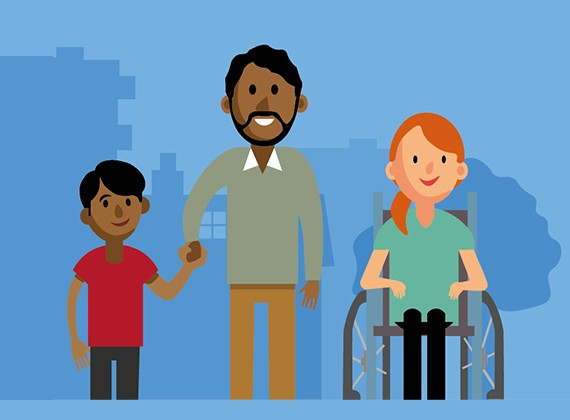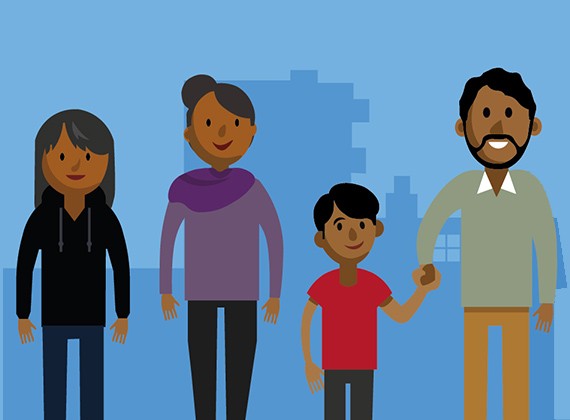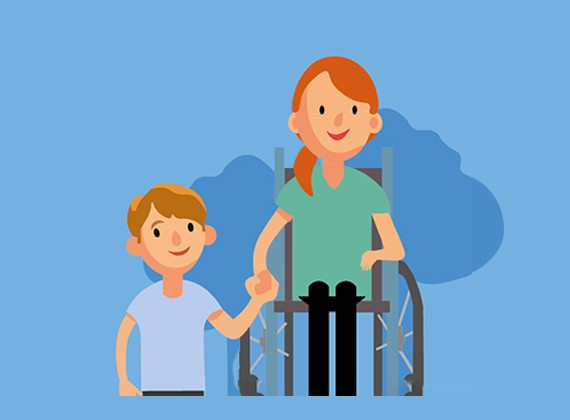

Resources
The following resources have been compiled by our team of Family Ambassadors who all have lived experience of supporting a loved one through CAMHS services.
We hope that you find the information useful to support you through your inpatient journey, but if you require guidance on topics that are not listed here, please contact your local Family Ambassador who will be happy to help.
The following websites provide useful advice and information to help support you and your family with mental health difficulties and crises. Please speak with your local Family Ambassador if you would like to meet to discuss any of this information further or if you require signposting to local support.
- MIND - for helplines and listening services.
- YOUNG MINDs - for advice and information about mental health for parents of children with mental health difficulties.
- MENCAP - support for people with a learning disability (including autistic people) or their families.
- Anna Freud - advice and guidance for parents on supporting children and young people with poor mental health and wellbeing.
- Autism - National Autistic Society Mental Health Guides.
- Counselling Directory - this was set up to connect those in distress with a wealth of information and the ability to search for the most suitable counsellor or psychotherapist.
- NIMH - National Institute of Mental Health support and guidance on a range of mental health difficulties.
If you, or the person you care for, need extra help to pay for something there are benefits, grants, funds, and charities that may be able to help. Please speak with your Family Ambassador if you would like help to complete any applications, or if you would like to be signposted to support that might be available locally.
- Fightback4justice - offer free advice and advocacy for DLA and PIP. Free advice line and drop-in sessions covering the UK.
- Gov.UK - Disability Living Allowance (DLA) for children - help with the extra costs of looking after children under 16 years who need much more looking after than a child of the same age without a disability.
- Gov.UK - Personal Independence Payment (PIP) - to help with the extra costs of living for those with a physical or mental health condition, or disability and over 16 years.
- Turn2Us - benefits and grants calculator.
- Carers UK - information on grants and support schemes.
- Carers Trust - information regarding grants, funds, and charities that may be able to help carers pay for something.
- Lightning Reach - help people facing financial hardship to receive support, recover from shocks and build financial resilience.
- Gov.UK - Benefits and financial support - details on applying for Carers Allowance.
- Citizens Advice - Check what benefits to claim if you’re sick or disabled advice on benefits such as Universal Credit and Jobseekers Allowance.
Below are some links to information which can support you in navigating the EHCP process (including asking for a re-assessment of need), school refusal and special educational needs. Please speak with your Family Ambassador if you would like to discuss any of this information further or if you would like further guidance on what support might be available locally.
- IPSEA - EHC plans, EHC needs assessments and appeals
- IPSEA - Asking for a Re-Assessment of Need - if your child or young person's needs have changed significantly since the EHCP was issued, or if they need more or different help, or need to attend a different school.
- Gov.UK - SEND code of practice: 0 to 25 years
- Not Fine in School - School Refusal, School Attendance
- Council for Disabled Children - Find your local IAS service
It can be extremely complex and overwhelming to try and understand the legal rights of your child or young person when they are admitted to an Inpatient Unit. The following websites provide support and information, but please do speak to your local Family Ambassador if you need additional help or signposting.
In certain circumstances, your child or young person will be entitled to support from the IMHA service (Independent Mental Health Advocacy). Please speak to the Unit for advice about accessing this support. The following website also provides further information: IMHAs in England - Mind
- The Mental Health Act explains the Mental Health Act, what it covers and what your rights are.
- Human Rights in CAMHS | British Institute of Human Rights (bihr.org.uk) explaining human rights law and young people's rights in an inpatient mental health unit.
- Short NHSE Resource (bihr.org.uk) Your Human Rights (a guide for young people accessing inpatient mental health services).
- Information for 11-18 year olds: your rights (Mind) understanding legal rights for 11-18-year-olds with mental health difficulties.
- Explain Section 117 of the Mental Health Act, ‘Section 117 Aftercare’ Information about your rights to care and support after leaving the hospital.
The following information has been collated by our team of Family Ambassadors and includes resources that we have found really useful to support a loved one with an eating disorder.
Please speak with your Family Ambassador if you would like to discuss any of this information further or if you require to be signposted to help that might be available locally.
- BEAT: Free helpline for anyone affected by an eating disorder with online support groups. Call: 0808 801 6770 or visit https:/
/ for more information and self-help resources.www. beateatingdisorders.org.uk/ - POD (Peer support and Online Development) eLearn (beateatingdisorders.org.uk) is Beat's online learning platform designed to provide anyone supporting someone with an eating disorder with a space to learn, share experiences and find community through online courses, workshops and forums.
- PEACE Pathway Information and advice for autistic people who are experiencing an eating disorder, and for their parents and carers.PEACE Pathway - Home
- ARFID Awareness Provides information, advice and support to people experiencing ARFID, and to their parents and carers ARFID Awareness UK
- The Mix - Essential support for under 25s. Free, short-term online counselling for young people aged 25 or under. Their website also provides lots of information and advice about mental health and wellbeing. Email support is available via their online contact form. They have a free 1-2-1 webchat service available during opening hours. Opening times: 4pm - 11pm, Monday - Friday
- F.E.A.S.T.: Families Empowered and Supporting Treatment of Eating Disorders F.E.A.S.T.’s Mission is to support caregivers by providing information and mutual support, promoting evidence-based treatment, and advocating for research and education to reduce the suffering associated with eating disorders. Has a https://
feast-ed.org FEAST 30 Days is designed to educate and empower parents and caregivers of people with eating disorders. People who register for this program will receive one lesson per day, delivered to their inbox, over the course of 30 days. Each lesson is focused on a different topic related to eating disorders and caregiving. There are resources offered on every topic to provide a deeper and more robust understanding of what eating disorders are, how they are treated, and how families can best support their loved one. It is suitable for parents at all stages of their caregiving journey. Parents are given the opportunity each day to ask questions either about the lesson material or about their own personal situation. These questions are answered by our parent support volunteer team. https://www. feast-ed.org/ feast-30-days/ - Eating Disorders Association Northern Ireland: provide peer support for people with eating disorders and their loved ones, increase awareness and support skills in the wider community and campaign for eating disorder service improvements. Various support offered. https:/
/ www. eatingdisordersni.co.uk/ - Charlie Waller - provides mental health training, resources and consultancy with a focus on children and young people: https://
www. charliewaller.org/ what-we-offer/ eating-disorder-workshops-for-parents-and-carers - New Maudsley Carers Kent: Jenny Langley is an expert carer by experience in caring for a loved one with an eating disorder. Author of The New Maudsley Skills-based training manual. This link also includes worksheets and videos. https:/
/ newmaudsleycarers-kent.co.uk/ - FREED: First Episode Rapid Early Intervention for Eating Disorders; is a service for 16 to 25-year-olds who have had an eating disorder for three years or less. Its website has lots of resources including preparing for Uni. https:/
/ freedfromed.co.uk/ - SEED: A voluntary organisation offering support. https:/
/ seed.charity/ - Eva Musby: Expert by Experience: Help for parents of children and teens suffering from anorexia and other eating disorders. The links includes resources and YouTubes. https:/
/ afanorexiafamily.com/ - BodyWhys: The Eating Disorder Association of Ireland. is the national voluntary organisation supporting people affected by eating disorders and their families. They provide a range of non-judgemental listening, information and support services, as well as school talks, training, literature, webinars. Bodywhys is the support partner to the HSE’s National Clinical Programme for Eating Disorders https:/
/ www. bodywhys.ie/ - NATIONAL CENTRE FOR EATING DISORDERS: It's approved by the British Psychological Society. Everything you need about eating disorders, treatment, information and professional training in the help & treatment of eating disorders. https:/
/ eating-disorders.org.uk/
Podcasts
- Recovery Warriors - 18+: A community which empowers anyone struggling with an eating disorder to reach a strong active recovery by providing access to tools, training, and expert guidance. It is a first-of-its-kind community to connect people to support that delivers real results using podcasts and articles. https://
recoverywarriors.com/ food/ - Full of Beans: The eating disorder awareness project - Raising awareness and reducing the stigma associated with eating disorders through lived experience and research. https:/
/ www. fullofbeansed.co.uk/
YouTube
- Eating Disorders from the Inside Out: Laura Hill at TEDxColumbus. https://
www. youtube.com/ watch? v=UEysOExcwrE - New Maudsley training videos: https://
www. youtube.com/ @newmaudsleytraining6468/ videos
Apps
Beanbag Health - 18+
The digital app for lifelong recovery from eating and body image issues using 100s of people with lived experience to help build the app for people. Uses CBT-e and coaching. https:/
Booklist
Disclaimer: This booklist is a guide compiled over the years from recommendations by various parties. However, SPFT does not have the resources necessary to proofread recommended books and therefore does not accept responsibility for the content of any book on this list. It should also be noted that a book one person finds useful, another person may not. It is important that you find the publication that most suits your personal needs.
Parent/Carers:
FBT: 3 phases of recovery where full nutrition is viewed as a critical first step in recovery; the role of parents is to provide this nutrition by actively feeding their child.
- Help Your Teenager Beat an Eating Disorder (2015). By James Lock & Daniel Le Grange
- Survive FBT: Skills Manual for Parents Undertaking Family Based Treatment (FBT) for Child and Adolescent Anorexia Nervosa (2016). By Maria Ganci
- Anorexia and Other Eating Disorders; How to help Your Child Eat Well and Be Well by Eva Musby
- When Your Teen Has an Eating Disorder: Practical Strategies to Help Your Teen Recover from Anorexia, Bulimia, and Binge Eating (2018). By Lauren Muhlheim
New Maudsley Approach: an evidence-based therapy toolkit which equips carers with the communication skills they need to best help their loved one.
- Anorexia Nervosa: A Survival Guide for Families, Friends and Sufferers’ By Janet Treasure
- Caring for a Loved One with an Eating Disorder: The New Maudsley Skills-Based Training Manual (2018) By Jenny Langley, Gillian Todd and Janet Treasure
- How to Help Someone with an Eating Disorder: A Practical Handbook:Dr Pamela MacDonald
- The Practical Handbook of Eating Difficulties: A comprehensive guide from personal and professional perspectives (2021). By James Downs, Mark Hopfenbeck, Hannah Lewis, Isla Parker & Nicole Schnackenberg
- How to Help Someone with an Eating Disorder: A Practical Handbook (2021). Dr Pamela Macdonald
- Hope with Eating Disorders Second Edition: A self-help guide for parents, carers and friends of sufferers (2019): Lynn Crilly
- Rehabilitate, Rewire, Recover!: Anorexia Recovery for the determined adult (2019). By Tabitha Farrar
EDs and Autism
- Supporting Autistic People with Eating Disorders: A Guide to Adapting Treatment and Supporting Recovery (2018). By Kate Tchanturia
- Autism and eating disorders in teens – a guide for parents and professionals (2020). By Fiona Fisher Bullivant and Sharleen Woods
Food Ideas
How to Nourish Your Child Through an Eating Disorder: A Simple, Plate-By-Plate Approach(r) to Rebuilding a Healthy Relationship with Food (2018). Casey Crosbie and Wendy Sterling.
BodyWhys: This booklist is a guide compiled over the years from recommendations by various parties. However, Bodywhys does not have the resources necessary to proofread recommended books and therefore does not accept responsibility for the content of any book on this list. It should also be noted that a book one person finds useful, another person may not. It is important that you find the publication that most suits your personal needs. Please note, Bodywhys cannot endorse or promote any publication. https://
Autism is not a mental health problem but autistic people can have good and bad mental health like anyone else.
The following information can support you and your family if your child has a diagnosis of autism (or is awaiting a diagnosis) and is struggling with their mental health.
- National Autistic Society has guidance on a range of mental health topics. Mental health (autism.org.uk)
- Ambitious About Autism resources celebrating autistic children and young people. Ambitious about Autism as well as giving support around behaviours that challenge. Behaviours that challenge | Ambitious about Autism
- Not Fine in School videos about autism What is autism? and also a focus on pathological demand avoidance (PDA) Demand Avoidance of the PDA Kind
Autism and Eating Disorders
Up to 23% of young people with eating disorders are also autistic. The following website provides useful information to support your loved one and your family.
- National Autistic Society Eating Disorders and Autism
- Pooky Knightsmith (2020), based on a talk given for the PEACE pathway. Autism & Anorexia 5 Things you Need to Know About the Interplay
Autism in girls
- The Curly Hair Project is an organisation that helps people on the autistic spectrum and the people around them. Alis Rowe The Girl with the Curly Hair
- The Autistic Girls Network aims to raise awareness of autism in girls. The Autistic Girls Network


